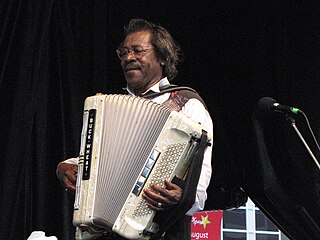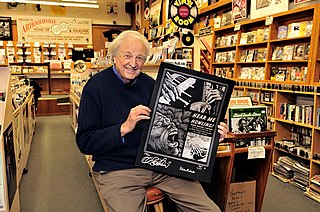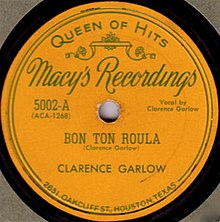
Zydeco is a music genre that was created in rural Southwest Louisiana by Afro-Americans of Creole heritage. It blends blues and rhythm and blues with music indigenous to the Louisiana Creoles, such as la la and juré. Musicians use the French accordion and a Creole washboard instrument called the frottoir.

Sidney Simien, known professionally as Rockin' Sidney, was an American R&B, zydeco, and soul musician who began recording in the late 1950s and continued performing until his death. He is best known for his 1985 single "My Toot-Toot", which reached top 20 on the Billboard Hot Country Songs charts and earned him a Grammy Award.
The music of Louisiana can be divided into three general regions: rural south Louisiana, home to Creole Zydeco and Old French, New Orleans, and north Louisiana. The region in and around Greater New Orleans has a unique musical heritage tied to Dixieland jazz, blues, and Afro-Caribbean rhythms. The music of the northern portion of the state starting at Baton Rouge and reaching Shreveport has similarities to that of the rest of the US South.

BeauSoleil is a Cajun band from Louisiana, United States.

Clifton Chenier, was an American musician known as a pioneer of zydeco, a style of music that arose from Creole music, with R&B, blues, and Cajun influences. He sang and played the accordion. Chenier won a Grammy Award in 1983.
Maison de Soul is a Louisiana-based Zydeco and blues record label. It was founded in 1974 in Ville Platte, Louisiana by Floyd Soileau and remains under his ownership. It is one of four record labels under Soileau's Flat Town Music Company umbrella, and combined the Flat Town labels make up "the largest body of Cajun, zydeco, and swamp music in the world". Living Blues magazine has called Maison de Soul "the country's foremost zydeco label".
Arhoolie Records is an American small independent record label that was run by Chris Strachwitz and is based in El Cerrito, California, United States The label was founded by Strachwitz in 1960 as a way for him to record and produce music by previously obscure "down-home blues" artists such as Lightnin' Hopkins, Snooks Eaglin, and Bill Gaither. Strachwitz despised most commercial music as mouse music. Arhoolie still publishes blues and folk music, Tejano music including Lydia Mendoza, Los Alegres de Terán, Flaco Jiménez, regional Mexican music, cajun, zydeco, and bluegrass.

Christian Alexander Maria Graf Strachwitz von Groß-Zauche und Camminetz was a German-born American record label executive and record producer. He was the founder and president of Arhoolie Records, which he established in 1960 and which became one of the leading labels recording and issuing blues, Cajun, norteño, and other forms of roots music from the United States and elsewhere in the world. Strachwitz despised most commercial music as mouse music.

The term Creole music is used to refer to two distinct musical traditions: art songs adapted from 19th-century vernacular music; or the vernacular traditions of Louisiana Creole people which have persisted as 20th- and 21st-century la la and zydeco in addition to influencing Cajun music.

C. J. Chenier is the Creole son of the Grammy Award-winning "King of Zydeco", Louisiana musician, Clifton Chenier. In 1987, Chenier followed in his father's footsteps and led his father's band as an accordion performer and singer of zydeco, a blend of cajun and creole music. With five previous albums to his credit, by 1994, Chenier began to record for Chicago-based Alligator Records.

Ida Lewis "Queen Ida" Guillory is a Louisiana Creole accordionist. She was the first female accordion player to lead a zydeco band. Queen Ida's music is an eclectic mix of R&B, Caribbean, and Cajun, though the presence of her accordion always keeps it traditional.

Raisin' Cain is an album by Johnny Winter, released in 1980 by Blue Sky Records. A retrospective album review for AllMusic by William Ruhlmann notes the mix of rock and roll, Chicago blues, and New Orleans rhythm and blues/New Orleans blues tunes lacks any compositions by Winter. Ruhlmann gave the album three out of five stars and concluded:
The water-treading of Raisin' Cain suggests that a new approach is in order, maybe an outside producer who can bring a different perspective or somebody to look for good songs, if the artist isn't going to write his own material.
"Let the Good Times Roll" is a jump blues song recorded in 1946 by Louis Jordan and his Tympany Five. A mid-tempo twelve-bar blues, the song became a blues standard and one of Jordan's best-known songs.
The expression Laissez les bons temps rouler is a Louisiana French phrase. The phrase is a calque of the English phrase "let the good times roll", that is, a word-for-word translation of the English phrase into Louisiana French Creole.

Cedric Watson is an American musician. He has been nominated four times for Grammy Awards.

Clarence Joseph Garlow was an American guitarist, singer and songwriter who performed in the R&B, jump blues, Texas blues and cajun styles. He is best known for his recording of the song "Bon Ton Roula", which was a hit single on the U.S. Billboard R&B chart in 1950. One commentator called it "a rhythm and blues laced-zydeco song that helped introduce the Louisiana music form to a national audience."
Eh La Bas is a traditional New Orleans song. Originally it was sung with Cajun lyrics but was later given French lyrics and the common title from the French lyrics. There have been numerous versions, including English lyrics that refer to both the Cajun and French versions, and all employ a call and response.

Bogalusa Boogie is a studio album by the American zydeco musician Clifton Chenier. It was released in 1975 via Arhoolie Records. The album was inducted into the Grammy Hall of Fame in 2011. In 2016, the album was inducted into the Library of Congress' National Recording Registry.

Hot Rod is an album by the American musician C.J. Chenier, released in 1990. He is credited with the Red Hot Louisiana Band. Although Chenier grew up listening primarily to R&B, he considered Hot Rod to be a traditional zydeco album.
Preston Frank is an American zydeco musician.













